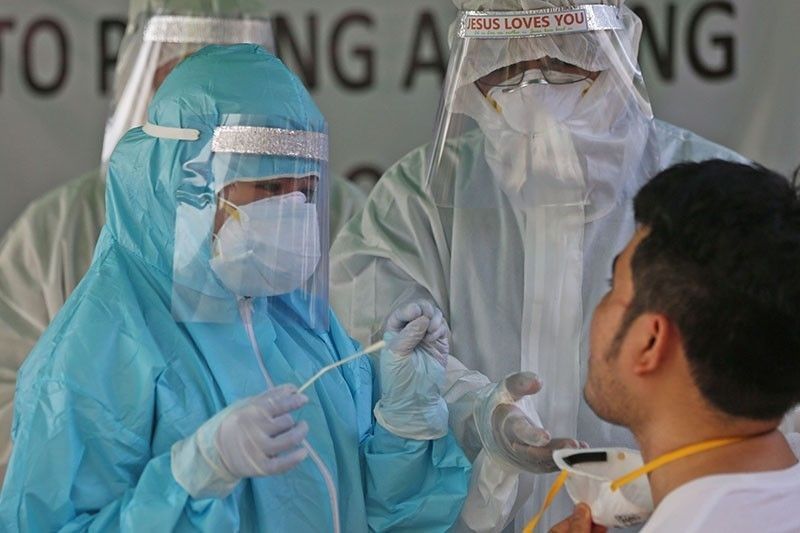Too soon for GCQ in 'high-risk' areas like Metro Manila — UP researchers

MANILA, Philippines — Researchers from the University of the Philippines on Thursday warned anew against a likely shift from modified enhanced community quarantine (MECQ) to a less stringent general community quarantine (GCQ) in Metro Manila and other high-risk areas.
The researchers—led by Professor Guido David, Ph.D. of the UP Institute of Mathematics; Associate Professor Ranjit Singh Rye of the UP Department of Political Science; and OCTA Research Associate Ma.Patricia Agbulos—said that based on available data on disease transmission and epidemiological risk factors, MECQ should continue in high-risk areas.
In their forecast report on Thursday, they said: "We further caution the government on the premature relaxation of the MECQ without substantial data and without the minimum health safeguards in place in affected areas regardless of the historical number of cases.”
More testing needed
While researchers lauded the government for improving testing capacity to an estimate of 32,000 a day, they said many more need to be done since opening up MECQ areas would expose more people to the risk of catching COVID-19.
"Even with a testing rate of just 10% for workers in NCR, Calabarzon, Central Luzon, Cebu City and Davao, this corresponds to about 2.4 million tests that need to be administered. Spread out over 60 days, this averages to 40,000 tests per day," they said.
Aside from increasing testing capacity, the government must also make the turnaround time on the tests shorter, which would mean accrediting more laboratories, training more people to conduct the tests and ensuring lab supplies are always available.
The forecast report reiterated the need for better contact tracing, a recommendation that the researchers also made earlier in May.
"While it can be argued that the national health system has not been overwhelmed as a result of the ECQ, we emphasize that mass targeted testing and contact tracing have to be vastly improved by the time NCR and other high-risk areas transition to GCQ."
Review of safety protocols
They also noted that the number of COVID-19 cases in the cities of Makati, Las Piñas and Pasay "increased substantially" in the first week of MECQ, which started on May 15.
"There were also increases in the number of new COVID-19 cases in Manila, Taguig, Muntinlupa, Caloocan and Pateros," they said, adding the shift to GCQ may make the increase in cases even worse.
They said minimum health safeguards and quarantine mechanisms against the spread of COVID-19 in areas at high risk of transmission should be reviewed to avoid these increases.
Data issues
The report looked at the first ten days of MECQ and discovered a backlog in the official count of COVID-19 cases.
Data from the study revealed that 7,119 cases of COVID-19, reported by testing centers, were left out of the official count released by the health department on May 24 because these still had to be validated.
The total of confirmed cases announced on May 24 was 14,035 but the UP researchers said the actual figure was at 21,154.
Of these 7,119 unreported cases, 1,498 were from Metro Manila. The researchers added that new cases in NCR from May 19-25 were "greater than five per day per million of population.” They said this data suggests that NCR should still be classified as “high risk.”
The study also revealed that, as of May 25, the number of unvalidated positive cases is steadily increasing.
Given this backlog in the official count of COVID-19 cases, researchers called for the need "to improve the turnaround time of test results.”
They recommended that this be done "by fast tracking the accreditation of more laboratories, investing in training of more human resource, and ensuring timely and sufficient laboratory supplies.”
Palace says shift to GCQ based on data
Presidential spokesperson Harry Roque earlier today said that Metro Manila is ready to be placed under GCQ.
Roque, who is also spokesperson of the COVID-19 inter-agency task force, added that the doubling rate of novel coronavirus critical cases and critical care capacity are the criteria for deciding on whether to place areas under lockdown.
It seems, however, that experts disagree with this assessment.
“If quarantine decisions are solely based on disease transmission and other epidemiological risk factors, then based on the available data, we recommend that the national government continue the MECQ in NCR and consider the same in other high-risk areas,” UP researchers said.
The report also highlighted the role of contact tracing in containing the virus. The World Health Organization recently pointed out the sluggish rate of contact tracing in the country.
As of Thursday afternoon, DOH reported 15,558 COVID-19 cases — the biggest rise in a single day since March 31 — and a death toll of 921 in the country. Sixty-one percent of these new cases were from Metro Manila.
Duterte yet to decide on lockdown plans
The Inter-Agency Task Force on the Management of Emerging Infectious Diseases (IATF) on Wednesday night recommended to President Rodrigo Duterte that Metro Manila be placed under GCQ from June 1 to 15.
Under GCQ, several non-essential industries will be allowed to reopen. Public transport will also be allowed to resume operations at a reduced capacity to ensure proper social distancing.
The final decision still lies with President Rodrigo Duterte who will meet with the IATF and his Cabinet tonight.
Roque said Duterte will announce his decision Thursday night in a televised address. The Palace did not say when the address, often pre-recorded, would be aired.
- Latest
- Trending































